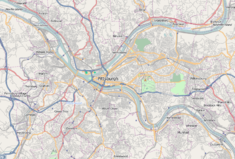AFRO-AMERICAN MUSIC INSTITUTE CELEBRATES 36 YEARS
http://www.indiegogo.com/projects/building-today-for-tomorrow/x/267428
Pain Relief Beyond Belief
http://www.komehsaessentials.com/
PITTSBURGH JAZZ
From Blakey to Brown, Como to Costa, Eckstine to Eldridge, Galbraith to Garner, Harris to Hines, Horne to Hyman, Jamal to Jefferson, Kelly to Klook; Mancini to Marmarosa, May to Mitchell, Negri to Nestico, Parlan to Ponder, Reed to Ruther, Strayhorn to Sullivan, Turk to Turrentine, Wade to Williams… the forthcoming publication Treasury of Pittsburgh Jazz Connections by Dr. Nelson Harrison and Dr. Ralph Proctor, Jr. will document the legacy of one of the world’s greatest jazz capitals.
Do you want to know who Dizzy Gillespie idolized? Did you ever wonder who inspired Kenny Clarke and Art Blakey? Who was the pianist that mentored Monk, Bud Powell, Tad Dameron, Elmo Hope, Sarah Vaughan and Mel Torme? Who was Art Tatum’s idol and Nat Cole’s mentor? What musical quartet pioneered the concept adopted later by the Modern Jazz Quartet? Were you ever curious to know who taught saxophone to Stanley Turrentine or who taught piano to Ahmad Jamal? What community music school trained Robert McFerrin, Sr. for his history-making debut with the Metropolitan Opera? What virtually unknown pianist was a significant influence on young John Coltrane, Shirley Scott, McCoy Tyner, Bobby Timmons and Ray Bryant when he moved to Philadelphia from Pittsburgh in the 1940s? Would you be surprised to know that Erroll Garner attended classes at the Julliard School of Music in New York and was at the top of his class in writing and arranging proficiency?
Some answers can be gleaned from the postings on the Pittsburgh Jazz Network.
For almost 100 years the Pittsburgh region has been a metacenter of jazz originality that is second to no other in the history of jazz. One of the best kept secrets in jazz folklore, the Pittsburgh Jazz Legacy has heretofore remained mythical. We have dubbed it “the greatest story never told” since it has not been represented in writing before now in such a way as to be accessible to anyone seeking to know more about it. When it was happening, little did we know how priceless the memories would become when the times were gone.
Today jazz is still king in Pittsburgh, with events, performances and activities happening all the time. The Pittsburgh Jazz Network is dedicated to celebrating and showcasing the places, artists and fans that carry on the legacy of Pittsburgh's jazz heritage.
WELCOME!
Groups
Duke Ellington is first African-American and the first musician to solo on U.S. circulating coin
MARY LOU WILLIAMS
Crawford Grill
| Crawford Grill | |
|---|---|
| Pennsylvania Historical Marker signification | |
|
Crawford Grill number 2 (2009)
|
|
| Location: | 2141 Wylie Avenue Pittsburgh, Pennsylvania United States |
| Coordinates: |  40.44567°N 79.97804°WCoordinates: 40.44567°N 79.97804°WCoordinates:  40.44567°N 79.97804°W 40.44567°N 79.97804°W |
| Governing body/Owner: | Pennsylvania Historical and Museum Commission |
| PA marker dedicated: | April 7, 2001 |
Crawford Grill was a renowned jazz club in Pittsburgh, Pennsylvania's Hill District. Its heyday was the 1930s to 1950s.
History
The club was founded by Gus Greenlee, who first made his reputation as a numbers runner and racketeer, then later as the owner of the Negro League baseball team the Pittsburgh Crawfords.
Music lovers flocked to the Crawford Grill to hear Billy Eckstine, Sarah Vaughan, Erroll Garner, Dizzy Gillespie, and other legends of jazz. White musicians who played downtown venues would go uptown to "The Grill" after their gigs to jam into the night with black musicians. The Crawford Grill was a meeting spot for people of all colors who loved jazz.
Greenlee operated three Crawford Grill nightclubs in Pittsburgh. The original was opened in 1930 on the corner of Crawford Street and Wylie Avenue in a former hotel called the Leader House. It remained in business until 1951, when it was destroyed by a fire. The building was demolished in 1959 as part of the Civic Arena development plan.[1]
The second site, known to historians as Crawford Grill number 2, opened in 1943 on the corner of Wylie Avenue and Elmore Street, approximately ten blocks east of the original location. In 2001, the Pennsylvania Historical and Museum Commission dedicated a marker on the site.[2] However, the club closed its doors in 2002, and was put up for sale in 2006.[3] An investment group representing public and private interests purchased the building in 2009, and continues to pursue preservation and restoration work via the Crawford Grill Revitalization Project.[4]
Crawford Grill number 3 was the final, and least popular, of the Greenlee clubs. Located on the corner of Bidwell Street and Pennsylvania Avenue in the Manchester neighborhood of Pittsburgh, the club was open from 1948 until 1955.
In popular culture
- Referenced in the play Fences by August Wilson
References
- Jump up ^ "Owner of the Legendary Crawford Grill and the Pittsburgh Crawfords". Pittsburgh Music History. Retrieved 27 July 2013.
- Jump up ^ "Crawford Grill Historical Marker". Pennsylvania Historical and Museum Commission. 7 April 2001. "Text from historical marker: A center of Black social life where musicians such as Art Blakey, Mary Lou Williams, John Coltrane drew a racially mixed, international clientele. Here, Crawford Grill number 2, the second of three clubs opened 1943; was owned by William (Gus) Greenlee, later by Joseph Robinson."
- Jump up ^ Guidry, Nate (15 November 2006). "Hill District landmark Crawford Grill for sale". Pittsburgh Post-Gazette.
- Jump up ^ Spencer, Malia (1 March 2010). "Group of nonprofits, investors aim to bring Crawford Grill back". Pittsburgh Business Times.
External links
![]() Media related to Crawford Grill at Wikimedia Commons
Media related to Crawford Grill at Wikimedia Commons
|
||
Tags:
Replies to This Discussion
© 2025 Created by Dr. Nelson Harrison.
Powered by
![]()

